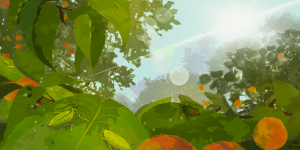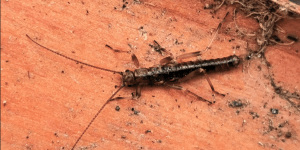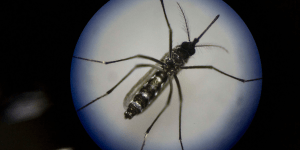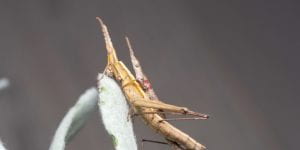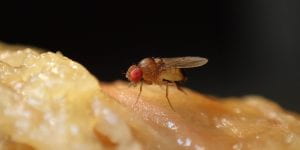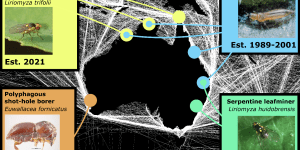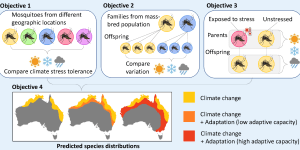Category: Research
-
Breaking Bad bugs: Testing potential biocontrol agents for pesticide tolerance
I have a passion for playing mad scientist with pesticides, all in the name of making agricultural pest control safer and more sustainable. If you’re fond of growing roses, you’re probably familiar with the frustrating critters that invade them in your garden. The critters, in this case aphids, are unfortunately fond of your roses, along […] -
Are you a mosquito magnet? Here’s why and what you can do about it
Dr Perran Stott-Ross and Holly Hyojung Kang This article was first published on Pursuit. Read the original article. Mosquitoes are some of the most effective hunters on the planet. They can track you down at great distance by sniffing out the air you breathe. Once they find exposed skin, they use their needle-like proboscises to […] -
Victoria’s new habitat law fails to protect a tiny endangered species
By Eddie Tsyrlin and Ary Hoffmann This article was first published on Pursuit. Read the original article. Australia’s unique and diverse wildlife is a source of national pride and global fascination. But this reputation is marred by our country’s alarming rate of species extinction. Australia has already earned the dubious title of the world leader […] -
Scientists and government agencies are targeting mosquitoes with bacteria
by Nancy Endersby-Harshman and Ary Hoffmann This article was first published on Pursuit. Read the original article Dengue fever is one of the most common tropical diseases in the world, affecting several million people every year. It is transmitted by mosquitoes, particularly a species known as Aedes aegypti, the yellow fever mosquito. Dengue is a […] -
The breeding trap targeting Melbourne’s growing mozzie problem
Véronique Paris, Liam Ferguson, Nicholas Bell and Ary Hoffmann Banner: Marianne Coquilleau Mosquito-borne diseases like dengue and Japanese encephalitis may feel like far-distant nightmares for many Victorians. Here, the warmer summer months coinciding with the mosquito season are more synonymous with backyard BBQs and backyard cricket than the smell of tropical strength repellents and mosquito […]blogs.unimelb.edu.au/pearg/2024/02/01/the-breeding-trap-targeting-melbournes-growing-mozzie-problem
-
The wingless grasshopper that could cross Bass Strait, but not the Yarra River
Hiromi Yagui, Michael Kearney & Ary Hoffmann Most grasshoppers can fly and some, notably locusts, can travel thousands of kilometres. However, there is a whole family of grasshoppers in Australia that can’t fly at all, and they are not very good at hopping either. These are the morabine (or ‘matchstick’) grasshoppers, comprising around 240 species […] -
The fly DNA fighting killer bacteria
Dr Perran Stott-Ross and Professor Ary Hoffmann Artwork by Tank Monsternova https://www.monsternova.art/ This article was first published on Pursuit. Read the original article. The more we learn about the biological world, the more complex it becomes. Nowhere is this more apparent than in recent discoveries about the ways in which microorganisms influence their hosts. The […]blogs.unimelb.edu.au/pearg/2023/03/29/the-fly-dna-fighting-killer-bacteria
-
Q&A: Victoria’s monster mosquito explosion
By Véronique Paris, Nick Bell and Professor Ary Hoffmann This article was first published on Pursuit. Read the original article. It’s evening and you’re just starting to relax after a hectic day. Just as you do, you hear the unmistakable high whine of a circling mosquito. It’s something most of us are used to in […]blogs.unimelb.edu.au/pearg/2022/11/24/qa-victorias-monster-mosquito-explosion
-
New DECRA projects coming soon! 2/2
Molecular biosecurity: Genomic databanks for managing invasive pests – Tom Schmidt Insect pests frequently establish invasions in Australia or are detected as incursions at borders, but little is often known about where they’ve come from or how best to manage them now they are here. One way to investigate these questions is to sequence and […]blogs.unimelb.edu.au/pearg/2022/09/27/new-decra-projects-coming-soon-2-2
-
New DECRA projects coming soon! 1/2
Predicting the future threat of mosquitoes under climate change – Perran Stott-Ross Mosquitoes are major global pests, transmitting harmful pathogens to humans and livestock and causing significant nuisance biting. Climate change will lead to unprecedented temperature increases in Australia, shifting the habitats that are suitable for mosquitoes. Insects are capable of rapid evolution, but we […]blogs.unimelb.edu.au/pearg/2022/09/27/new-decra-projects-coming-soon-1-2
Number of posts found: 65
